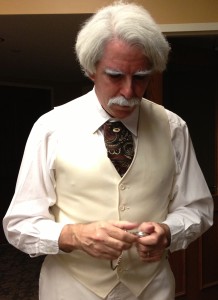 Will Underwood introduced our Speaker Mark Dawidziak – an internationally-recognized Mark Twain scholar, who has portrayed Mark Twain for the past forty years, among his many achievements. Here is the full video.
Will Underwood introduced our Speaker Mark Dawidziak – an internationally-recognized Mark Twain scholar, who has portrayed Mark Twain for the past forty years, among his many achievements. Here is the full video.Dawidziak, long an admirer of Mark Twain and his works, as well as a fan Rod Serling of the Twilight Zone TV series in the 60’s, has been able to draw some interesting parallels between two men who were once considered the best in their profession. Separated by nearly a century, each was dedicated to their profession – Twain, who got his start writing for newspapers and magazines, and Serling, who experienced an epiphany of sorts by discovering his love for writing when he enrolled in Antioch College after a stint in the military.
As Dawidziak goes on, the similarities between the two writers is almost unnerving: each created and emphasized their own speech patterns as part of their professional persona; both were doting fathers of two daughters with whom they spent much time; they each had heavy smoking habits, which may have been contributing factors in the circumstances surrounding their deaths – heart attacks; and each had a surviving daughter who wrote glowing memoirs about their fathers.
It was the times in which they existed that shaped their characters, and perhaps, had the greatest influence over their outlook on life. For Twain, the civil war provoked a disdain for committing violent acts against our fellow man – a notion that was evident in his writings, usually conveyed with his skillful use of humor. For Serling, WWII was all he needed to pen scathing indictments, like Twain, describing humankind’s treatment of one another. Unlike Twain, Serling used TV to get his message across. While Serling’s writings were not always deemed suitable for public consumption, he discovered TV as a medium through which he could get his message across, that came in the form of the creation of the enormously popular TV series “The Twilight Zone”.
Dawidziak concludes by describing both men as humanists, each having been influenced by violent episodes in their lives, and each developing a method of telling people the truth about themselves – one with humor, and one with fantasy. Twain was once described by a young keen mind as a “genial author”. In an unexpected retort upon reading this, he agreed that “someone had finally figured out he was a ‘moralist in disguise.’”
Author comments…
"I do a talk that crosses two areas of interest and several of my books. 'Moralists in Disguise' looks at the many professional and personal parallels between Mark Twain and Rod Serling.”





